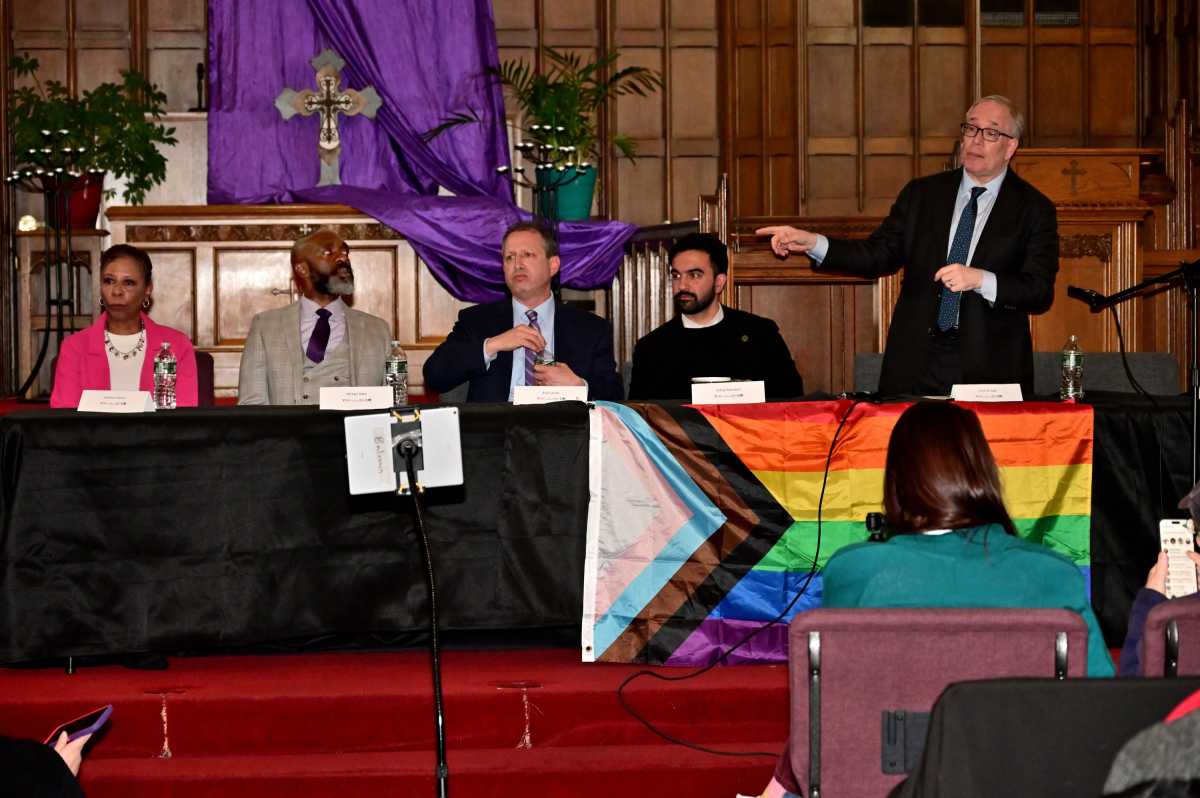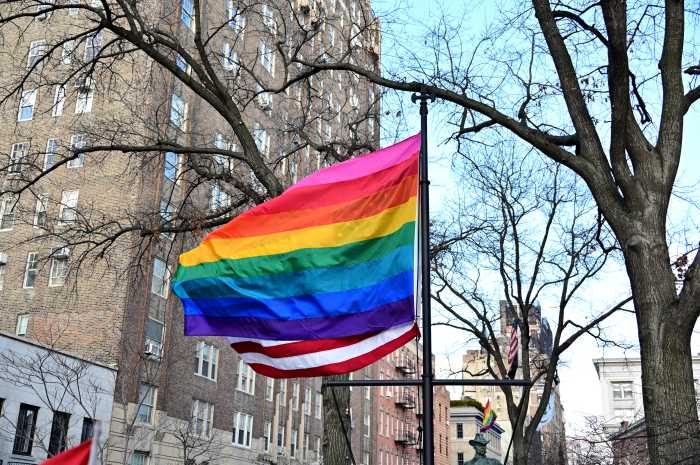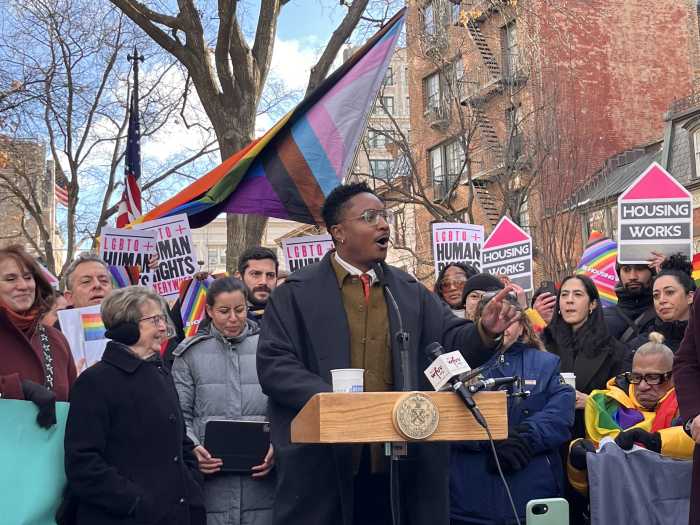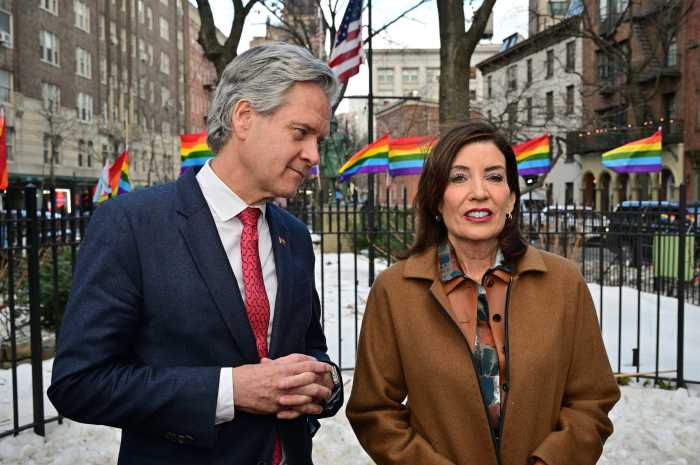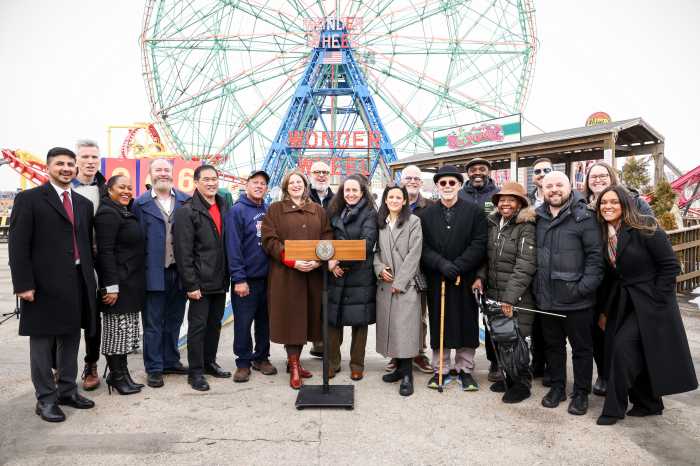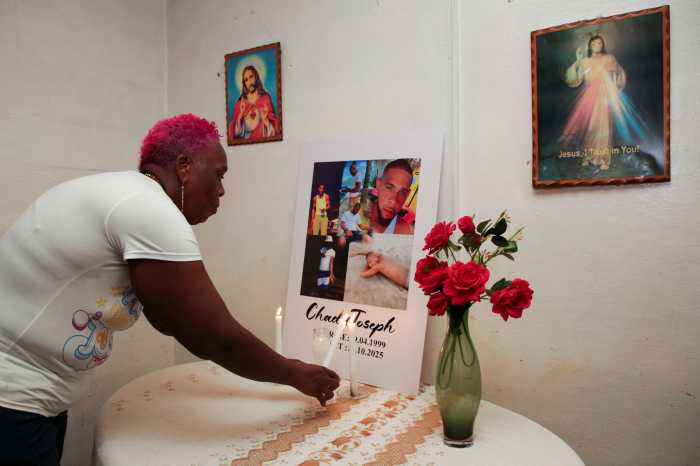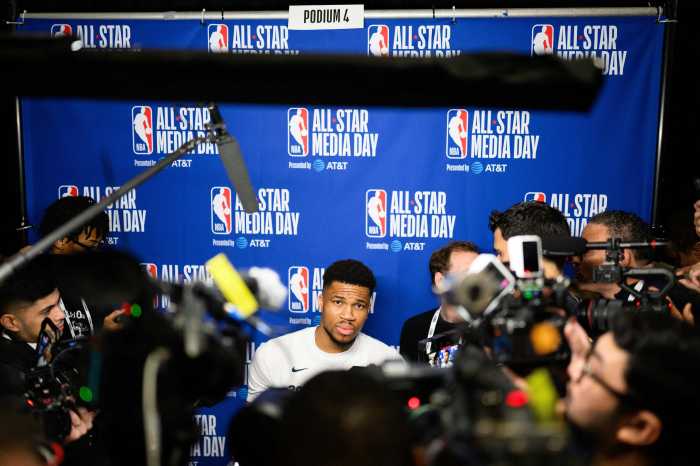With just three months remaining until the Democratic primary, six candidates vying to become the next mayor of New York City gathered at The Church of the Village on March 27 to participate in an LGBTQ mayoral forum jointly hosted by four political clubs and organizations.
City Council Speaker Adrienne Adams, former Assemblymember Michael Blake, City Comptroller Brad Lander, Queens Assemblymember Zohran Mamdani, Queens State Senator Jessica Ramos, and former City Comptroller Scott Stringer were on hand for the forum, which was moderated by Juan Manuel Benítez, a local journalism professor at Columbia University who previously worked with NY1.
Former Gov. Andrew Cuomo, Mayor Eric Adams, and Brooklyn Assemblymember Zellnor Myrie were invited to participate but did not attend.
The Stonewall Democratic Club of New York City, Lambda Independent Democrats of Brooklyn, NYC Pride and Power, and Equality New York jointly hosted the forum. There were occasional interruptions during the event, but the night went on relatively smoothly nonetheless.
The earlier portion of the forum addressed the status of gender-affirming care, which is under threat in the wake of the Trump administration’s late-January executive order vowing to cut off federal funding for institutions providing gender-affirming care to individuals 19 years of age or younger. In New York City, several hospitals responded to that executive order by canceling appointments and restricting care. Federal courts have blocked that executive order, but candidates who participated in the forum emphasized the need to come up with contingency plans.
“We need to make sure that we have gender-affirming care and that we direct our hospitals and our doctors and medical professionals and that we have their backs,” Stringer said. “That is something that I’m committed to.”
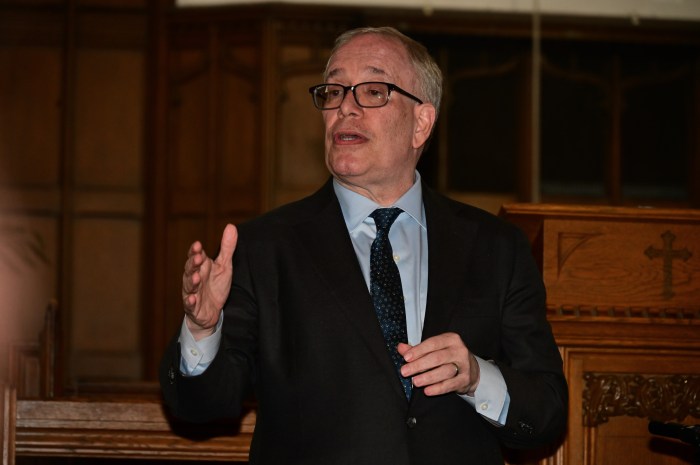
Mamdani, speaking as a sitting state lawmaker, voiced his support for an initiative led by several non-profit organizations to push the state to establish a $50 million fund to cover gender-affirming care if federal funding is slashed. But with just days remaining until the state’s budget deadline, Mamdani isn’t very encouraged.
“I’m disappointed in the negotiations thus far,” he said. “There has yet to be an explicit set-aside for funding of gender-affirming care.”
Mamdani said he believes “there is a role for the city to be a partner in that,” citing the sudden interruption of gender-affirming care at hospitals in the city.
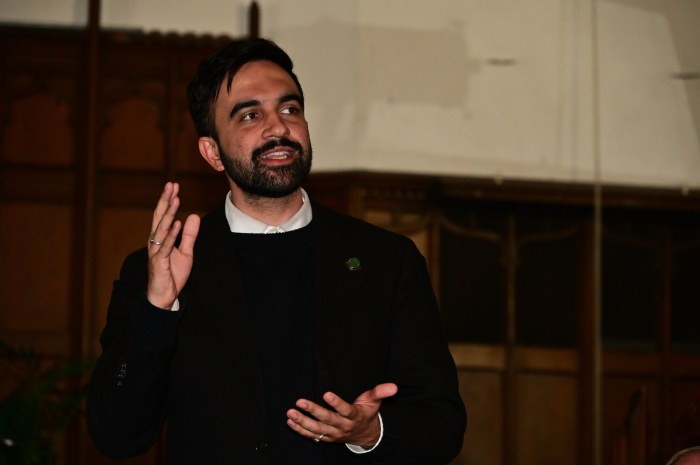
“I think what’s critically important right now is that we show that this city and this state could actually be a safe haven for those that are being targeted by this federal government,” he said.
Lander, the city’s comptroller, proposed creating a “new authority” funded with city, state, and private dollars “so we can have the resources to fund gender-affirming care and reproductive care.”
Blake, who argued that he is uniquely qualified to be mayor because he has experience at multiple levels of government, was among the candidates who argued that the city should not send federal taxes to the federal government if funding continues to be slashed.
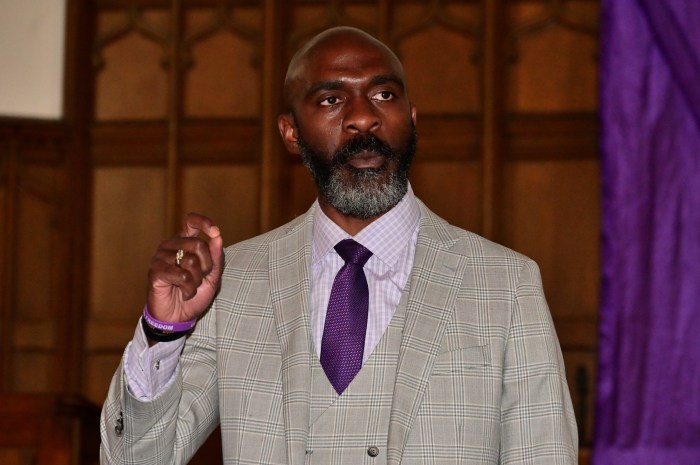
Ramos, who arrived later in the evening, expressed dismay over what she described as the federal government’s “attacks and abuse” against transgender Americans. Like some other candidates, she floated the concept of holding back federal taxes if the federal government fails to allocate funding to New York.
“If he really is going to take away federal funding — whether it’s from education, SNAP benefits, social security benefits, and many of our retirees, including HIV-positive survivors… we have to be able to withhold our federal taxes from Donald Trump,” Ramos said. “We have to.”
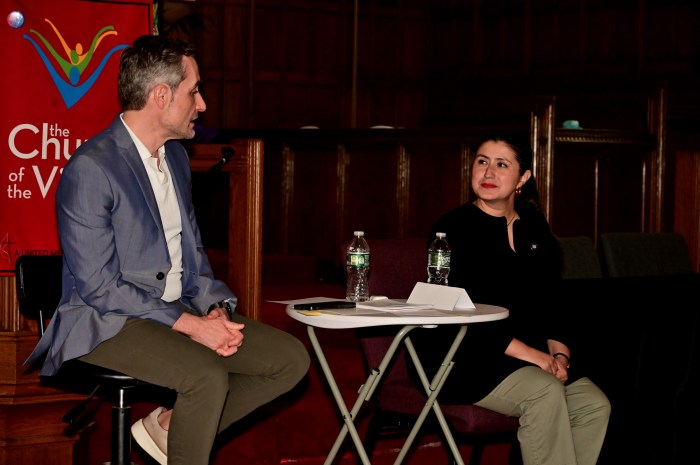
During her time on stage, Ramos committed to hiring a transgender commissioner to serve in her administration, and she condemned the current mayor for hiring anti-LGBTQ individuals early in his term.
Another major topic of the evening was Rikers Island, which is legally required to shut down by August of 2027, though many of the candidates acknowledged that it may not close by the deadline.
“We desperately have to close Rikers,” said Blake, who cited several ongoing issues with the current state of affairs — including the long travel distances required for court appointments and the rising death toll of people incarcerated there.
Lander recalled being an early supporter of closing Rikers Island during his time in the City Council and he further pointed to problems at Rikers, such as the backlog of people with mental health issues. He committed to closing Rikers if he becomes mayor.
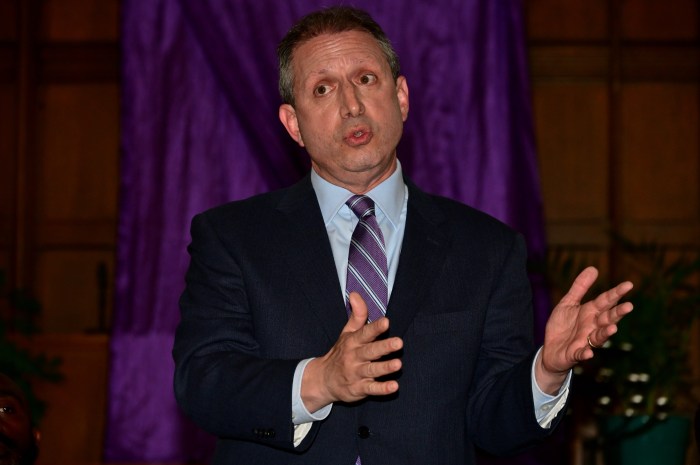
Ramos, for her part, also said “we have to make sure that we do close Rikers, and that we do so responsibly.”
Mamdani underscored the need to invest in alternatives to incarceration, such as supportive housing, which he said would save money and reduce recidivism.
“My commitment is to close Rikers Island,” he said.
Speaker Adams, accusing Mayor Eric Adams of having “done nothing but put people in jail to prevent Rikers from being closed,” said it “must be closed.” She acknowledged that “we have got to be realistic about the timeframe,” citing rising costs of building new facilities, but she nonetheless said that her “commitment is to close Rikers by the legal date, which is 2027.”
“If we cannot, it will be as close to 2027 as we can possible get,” she said.
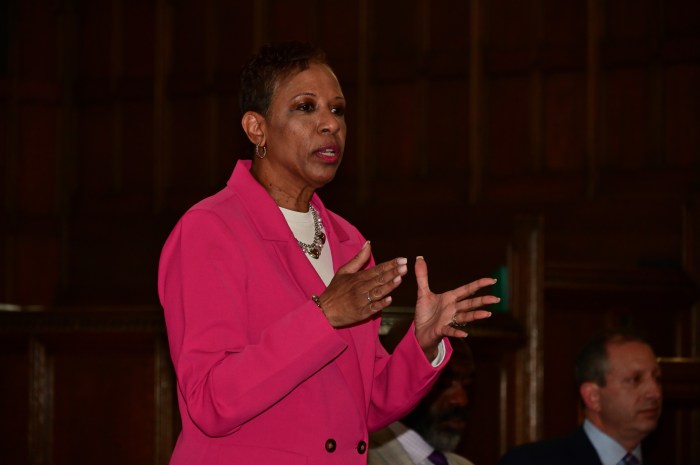
Some other topics were also covered, such as affordable housing, homelessness, and broader funding initiatives. Speaker Adams stressed the need to baseline funding — or make it permanent — in the city budget to address HIV/AIDS initiatives, LGBTQ youth services, and more, while Mamdani and Ramos called for workforce development programs for transgender New Yorkers.
Gabriel Lewenstein, the president of the Stonewall Democratic Club of New York City, said it was important for organizers of the evening to give candidates the opportunity to share their respective vision for LGBTQ rights directly with community members in the audience. The united front of four queer organizations, Lewenstein said, reflects the political power of New York City’s LGBTQ community.
“We’ve seen the current administration in the New York City Mayor’s Office and in Washington be very hostile to the LGBTQ community and especially the trans community,” Lewenstein said. “We were hoping that they would anwer some of the questions that our community members submitted this evening, and we were really pleased that they gave both specific answers and values-based answers that reassured many in the room that they were willing to fight for our community.”
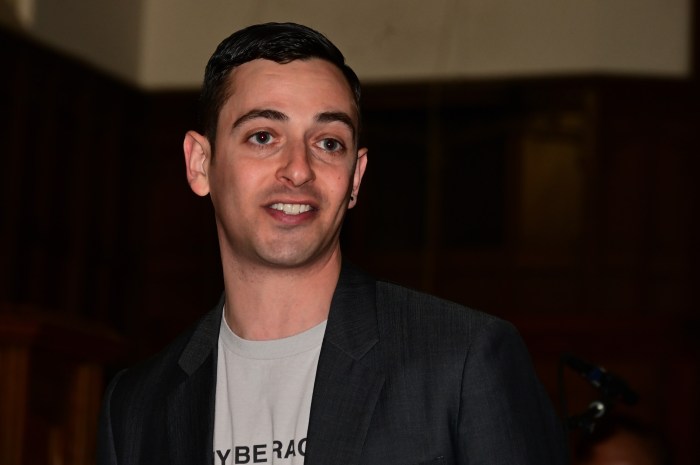
Melissa Sklarz, the executive vice president of Stonewall Democratic Club of New York City, said she hopes the forum will be one that the candidates remember.
“I’m happy to see the candidates come to the queer community and talk about LGBTQ issues in New York,” Sklarz said. “The number one issue is affordability, the number two is housing. Whether you’re LGBTQ or not, these are issues that affect all of us. People can no longer afford to live in New York City. There’s got to be a way for our political system to fight back against the developers. Otherwise there will be no one here except for Russian oligarchs. I believe these people care about queer people and they’ll do their best to help our community.”
Carmen Neely, the co-chair of NYC Pride and Power, was also pleased to see the candidates discussing LGBTQ issues — especially given the tumultuous political climate.
“Our LGBTQ community is under attack, and this attack is particularly aimed at our transgender, gender non-conforming, and non-binary siblings,” Neely said. “Now, more than ever, we are relying on our state and city elected officials to support our community and act in our best interests. The mayoral forum candidates answered our community’s questions and gave us a little more insight into their platforms, which will help us decide who to elect to the highest office in New York City. We look forward to hearing and seeing more from each of them as the campaign season continues.”

